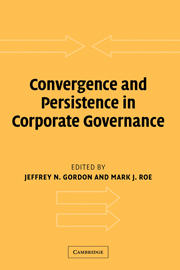Introduction
Published online by Cambridge University Press: 04 March 2010
Summary
Corporate governance is on the reform agenda all over the world. The remarkable political economy of the post-Cold War era has made both democracy and market-oriented capitalism ascendant, even if not inevitably linked. Competition among radically different economic systems – communism vs. capitalism – has abated. States are withdrawing from ownership of the means of production by privatizing state-firms and withdrawing from strong control by deregulating widely. Economic decisions once made by the state are increasingly left to autonomous, privately owned firms. Even if private corporate governance characteristics continue to differ, the most general of economic contrasts – private vs. government direction – is fading.
Global economic integration has been a key factor in the salience of corporate governance questions. Once confined to local economies, differently governed firms now compete with one another, as multilateral trade agreements and regional economic blocks such as the European Union have internationalized product markets, capital markets, managerial markets, and, to a lesser extent, labor markets.
Globalization affects the corporate governance reform agenda in two ways. First, it heightens anxiety over whether particular corporate governance systems confer competitive economic advantage. As trade barriers erode, the locally protected product marketplace disappears. A country's firms' performance is more easily measured against global standards. Poor performance shows up more quickly when a competitor takes away market share, or innovates quickly.
National decisionmakers must consider whether to protect locally favored corporate governance regimes if they regard the local regime as weakening local firms in product markets or capital markets.
- Type
- Chapter
- Information
- Convergence and Persistence in Corporate Governance , pp. 1 - 30Publisher: Cambridge University PressPrint publication year: 2004
- 10
- Cited by



